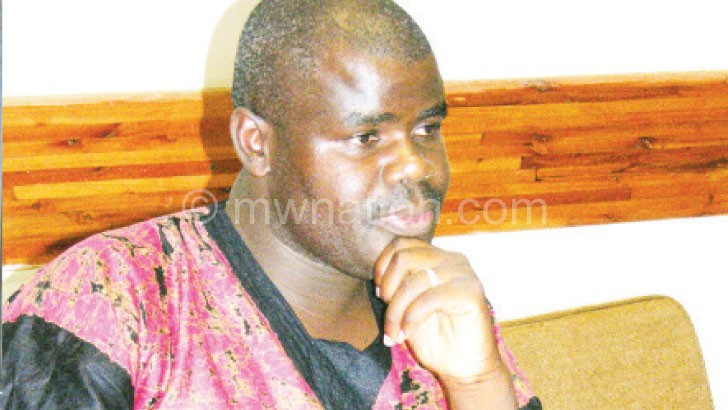‘Practice austerity measures with reality’
Our news analyst EPHRAIM NYONDO seeks views of Chancellor College lecturer in political science Dr Boniface Dulani on the 2015 political settllement.

Q
: It is without question that the critical thing of 2015 was government capacity to manage the economy. One key area was President Peter Mutharika’s charm offensive to bring back the donors who stopped supporting the National Budget. Malawi ended 2015 still with donors. How have you assessed Mutharika’s failure to bring back the donors?
A
: It is important to point out upfront that the causes of the current economic challenges go beyond the suspension of donor aid. The country’s economic policies, in my view, continue to make the country an unattractive investment destination. Ordinary Malawians continue to be squeezed with punitive taxes that make domestic savings and investment nigh impossible. On the issue of the president’s failure to win back donor support, I believe one of the main contributing factors has been his inconsistent position on the issue. One moment, the President is pleading with donors to re-open the aid taps, making promises to meet all conditionalities. A few days later, he goes all macho and claims that Malawi does not need donor aid. Such inconsistencies and policy failures are certainly not a good strategy to kick-start the economy or win back donor support.
Q
: President Mutharika has maintained his 20 member Cabinet for two years—of course with periodic reshuffles and changes all along. The move, according to officials, is to help cut back on public expenditure. Beyond that, we have also seen the President alternating commercial and private jets when flying out. On the whole, how do you assess this government’s resolve to cut on public expenditure?
A
: There is no doubt that by maintaining a lean cabinet, government has made savings, if anything, through salaries and other benefits that have been foregone. As for the other claims to rein in over expenditure, I am afraid government’s efforts have been more in speech than in deed. For example, many observers have pointed out at the high number of presidential and ministerial assistants, who might actually be drawing more resources than what we are able to save by having a lean cabinet. Similarly, the president might have made a few savings by cancelling a number of international trips, but the little savings are often offset by the penchant for expensive travel on the few occasions when this happens. One recalls the president’s decision not to attend the SADC [Southern
Africa Development Cooperation] Heads of State summit in Gaborone, Botswana in August 2015, which was touted as part of cost-cutting measures. Yet, the very next month, the President travelled with his historically large entourage to attend the UN summit in New York. This surely cost far more than the savings that were made from cancelling attendance at the SADC summit. This is of course not to mention the simple fact that the hired private jets costs more to travel to the US (even if only for part of the journey) than travelling to Gaborone. Saving one Kwacha today and spending ten Kwachas the next day is surely not a good strategy for reducing government expenditure.
Q
: The opposition, as a government in waiting, is key in providing alternatives to government. However, there have been criticisms regarding our opposition in the way it operates in Parliament and also on political podiums. The criticism has been to the effect that the opposition, apart from just faulting government on policy, has failed to bring alternative choices. How do you asses this?
A
: We should always remember that in a multiparty system like ours, it is the governing party, not the opposition that is entrusted with the responsibility of proposing and implementing policies that can take the country forward. Even if the opposition were to propose alternative policies, government is under no obligation to take up those proposals. In any case, in political science, we often say that voters are poor at rewarding the opposition when their proposals are embraced by government. A very good example in our context was the introduction of the Farm Input Subsidy Programme (Fisp) in 2005, which came about from as a result of opposition pressure in parliament. When the programme became successful, it was the Bingu wa Mutharika administration which took all the credit and voters rewarded his DPP in the 2009 elections. Under such circumstances, there is very little incentive for the opposition to propose alternative solutions as doing so would be condemning themselves to a lifetime in opposition.
Q: What are your aspirations for the nation and how would you want government and those in opposition to address them in 2016?
A
: The key to kick-starting the economy, in my view, ought to be the creation of a conducive investment environment, both for foreign and domestic investors. This would lead to job creation and simultaneously widen the tax base and contribute to increased exports, among other benefits. For this to happen, the government needs to revisit its business and tax policies. In the year that just ended, we had to pay punitive taxes for very poor service delivery.
Q
: Any other remark.
A
: I hope that government’s austerity measures are practiced in reality rather than simply by word of mouth, which has been mostly the case thus far. It is imperative that government, starting with the top leadership, reign in the all too common penchant for extravagant living. While it is beyond contestation that we are a poor country, you would not think this is the case when judging by the lavish lifestyles of our political leadership. In car parlance, I would say ours is a Toyota Duet economy and yet our leaders live, literally, Toyota Prado lifestyles. This is not sustainable and needs to change. n





